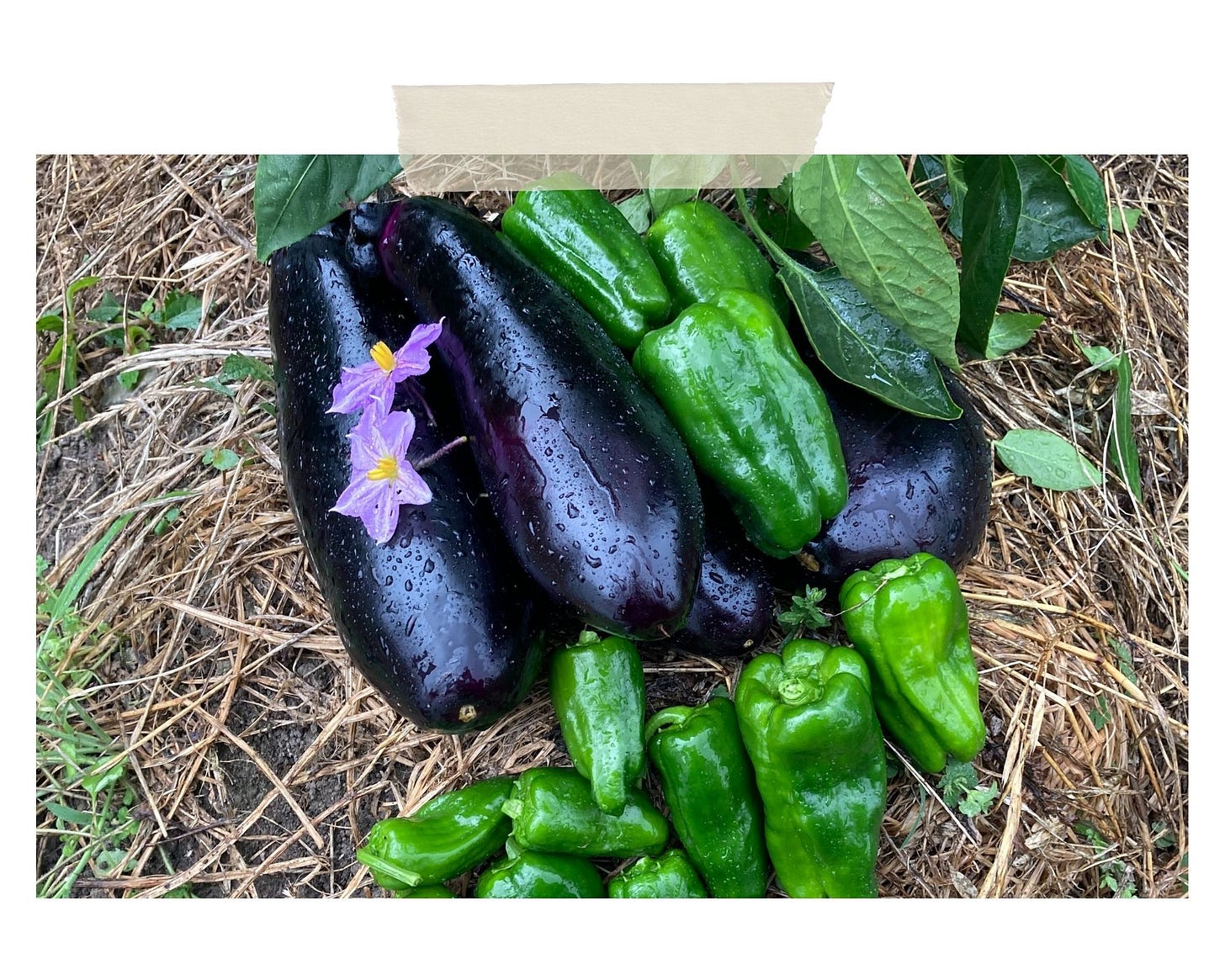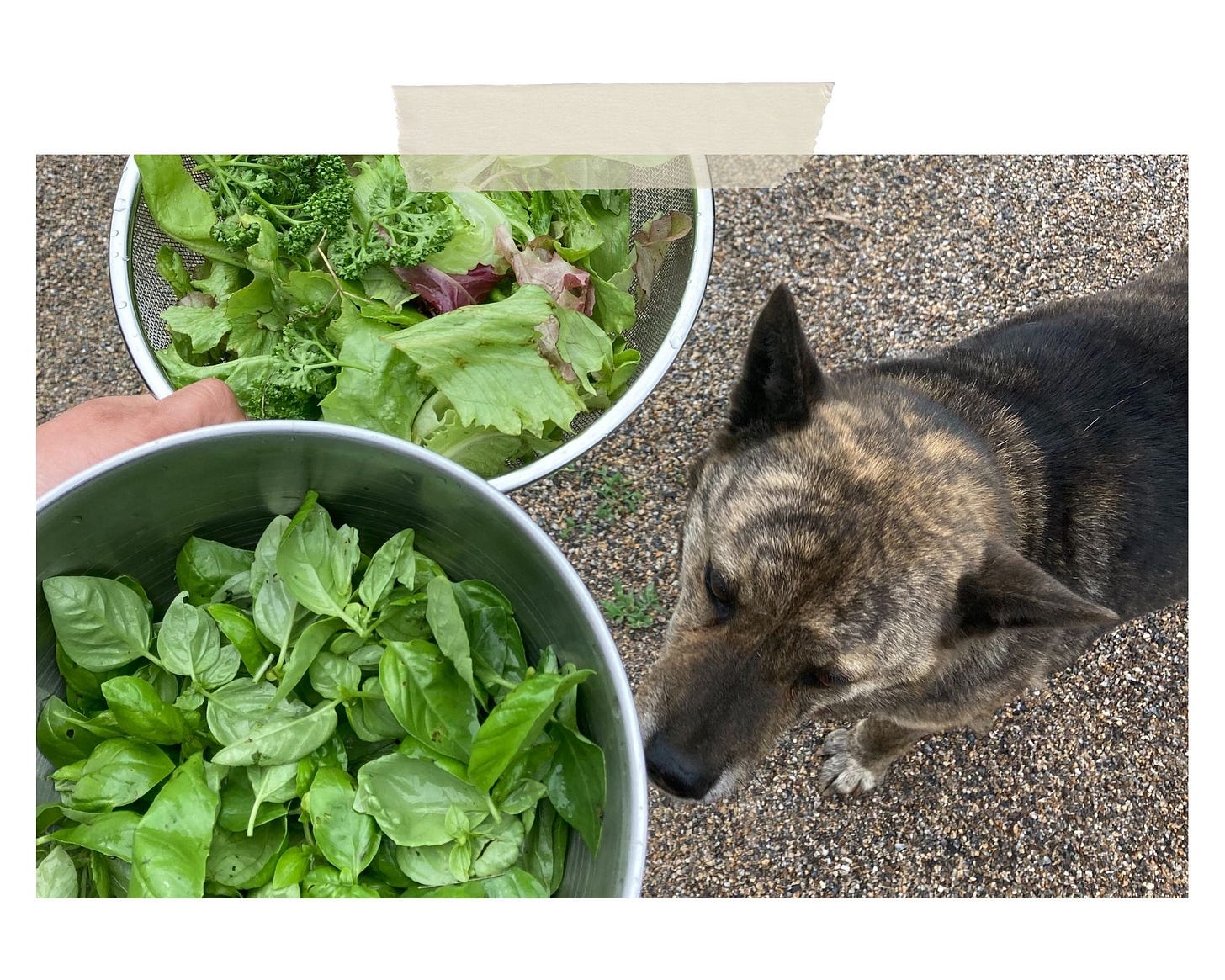Dear friends,
Once I month, I take a 2-hour road trip by myself to attend an organic farming school on a nearby island called Awajishima. Early in the morning, I throw my gardening tools, gloves, and lunchbox into the back of my car and head out of the mountains and towards the coast. Half theory, half practice in a shared garden, it’s the one day in a month when I’m extra grateful for the poignant reminder of the importance of food.
Last week I harvested the most beautiful dark purple flesh nasu (eggplants) and vibrant green piman (green peppers). These Japanese varieties of vegetables peak as summer approaches. It took about one month for the eggplant and green peppers to grow to a size large enough to be gathered.
Are you ever struck by things we completely take for granted? How can something that is half the size of a bread crumb grow into a flower that bears fruit? How do networks of roots stretch and weave through the soil to draw nutrients that help the vegetables grow? I’m in awe over and over again. I couldn’t believe how much joy I felt holding the harvest in my hands. It made me realize that growing food is one of the most satisfying things I have ever done.
Although mostly cliche now, the farm-to-table concept was both a homage to how food was traditionally consumed and a present-day protest against systems that make the food journey so disconnected and fragmented. But harvesting food I grew myself and making it into a meal for my friends was farm-to-table—no middle man, no distance traveled, just the same hands from start to finish. Growing and cooking food is a genuine and rewarding gift that I hope I can keep giving and receiving.
Living in the countryside and going to farming school has made me much more aware of food in general—from what I eat to what is in season, and much more broadly, what systems control the food that ends up on our plates.
Slow food
In thinking about the return to more intentional cultivation and eating, I am drawn to the philosophies of the Slow Food movement. Slow Food is a movement that brings together activists, producers, cooks, consumers, and everyone who believes that we can make a change in the current food system. The cracks in traditional agricultural systems reveal many injustices for many small-scale farmers who can’t compete with mass production and industrial farming and distribution. From environmental degradation to health illnesses, so many serious problems and challenges we face in the world are connected to food.
In the book, We Are What We Eat, author Alice Waters urges readers to fight for slow food culture, which she understands as the opposite of fast food. Waters describes the fast-food culture, as one that prioritizes cheapness, availability, and speed. The antidote? Slow Food. By eating in a slow food way, we can nurture a different kind of relationship with food and our food systems—one that uplifts values such as biodiversity and stewardship.
A critique of Water’s book is that her ideas are rooted in privilege, which I agree with to the extent that certain lifestyles and food choices (organic, vegan, etc.) are, in many circumstances, inaccessible for those who can’t afford to make those choices. But at the core of what she is trying to convey is the benefits of growing our food and cooking with simple and nutritious ingredients. In Kamikatsu, there are varying levels of self-sufficiency, but many people grow their food and have a different relationship with food, one that reflects locality and seasonality.
Slow movement
The Slow Food Movement is connected to the Slow Movement, which Carl Honoré describes (in his book In Praise of Slowness) as the act of reclaiming your time and slowing down to live happier, healthier, and more creative lives. If Slow Food fundamentally questions our current food and food systems, the Slow Movement takes on the challenge of trying to dismantle the materialism and consumerism that drives the global economy.
Slow, in Carl Honoré words, is: calm, careful, receptive, still, intuitive, unhurried, patient, reflective, quality-over-quantity. It is making real and meaningful connections—with people, culture, work, food, everything.
I think there’s an image that all people in the countryside live slow lives. I think it’s not entirely true, but also not a misguided thought. On one hand, I recognize how our environment shapes and influences our relationship with our surroundings. In a city (in a culture of convenience), most things move at the same, rather fast, speed. 2 minutes waiting for the next train is the same amount of time it takes to buy a meal at the convenience store. It’s the same 2 minutes that it takes to pour hot water into a plastic container that makes instant ramen. Our wants are met with instant gratification and very little delay.
The inconvenience of the countryside certain makes for gratifications to be much less instant and more contemplative. On the other hand, just because areas of life are inconvenient, I think that people can still buy into the contrary values of slow, which is: busy, controlling, aggressive, hurried, analytical, stressed, superficial, impatient, active, quantity-over-quality.
To be slow is to be accepting of the philosophies that encompass our relationship or acceptance of time, rather than try to be controllers of it. The best examples of slow I can think about relate to the patience asked of me by the plum wine that has to sit for a year and the miso that ferments over 6 months in a dark cool part of my house. Slow is the daily joy of taking my dogs on walks. It’s also the extra time it takes to buy vegetables from the farmer’s market because I start a conversation with whoever’s working that day.
In the end, whether it’s food or time, I think the slowness is about connecting with things that we all (somehow) intuitively know are good for us. We exist in systems that do not put health and well-being at the centre, and we are left to do the work of unlearning and relearning what is good for us. We must rewire and retune ourselves to things that are nourishing for our bodies and minds.
Further reads & listens:
The Guardian: Our food system isn't ready for the climate crisis (read)
On Being with Krista Tippett: Ross Gay Tending Joy and Practicing Delight (listen)
Because in trying to articulate what, perhaps, joy is, it has occurred to me that among other things—the trees and the mushrooms have shown me this—joy is the mostly invisible, the underground union between us, you and me, which is, among other things, the great fact of our life and the lives of everyone and thing we love going away. If we sink a spoon into that fact, into the duff between us, we will find it teeming. It will look like all the books ever written. It will look like all the nerves in a body. We might call it sorrow, but we might call it a union, one that, once we notice it, once we bring it into the light, might become flower and food. Might be joy. ― Ross Gay, The Book of Delights
Lastly, episode 3 of our podcast Bancha Talks was released this week! Please check it out for insight and laughs: Dating In The Japanese Countryside…And Other Burning Questions (listen)
Thank you for being here. I hope you have a wonderful week ahead—finding and creating moments to be slow.
With love,
Kana







Lovely from start to finish Kana! And very inspiring too :) Thank you!
very insightful!